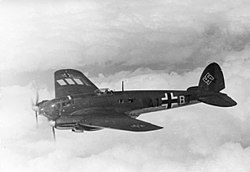
Back إعادة تسلح الرايخ الثالث Arabic Aufrüstung Catalan Tysklands oprustning i 1930'erne Danish Aufrüstung der Wehrmacht German Rearme alemán Spanish تسلیح مجدد آلمان Persian Réarmement de l'Allemagne sous le Troisième Reich French התחמשות גרמניה בין שתי מלחמות העולם HE Persenjataan kembali Jerman ID Riarmo tedesco Italian

German rearmament (Aufrüstung, German pronunciation: [ˈaʊ̯fˌʀʏstʊŋ]) was a policy and practice of rearmament carried out by Germany from 1918 to 1939 in violation of the Treaty of Versailles, which required German disarmament after World War I to prevent it from starting another war. It began on a small, secret, and informal basis shortly after the treaty was signed and was openly and massively expanded after the Nazi Party came to power in 1933.
Under the Weimar Republic, the early steps towards rearmament began with support for paramilitary groups including the Freikorps and Citizens' Defense, although the government banned most such groups by 1921. Secret cooperation between the German military and Soviet Russia began in 1921 and grew to include training in and manufacture of weapons banned by the Versailles Treaty. In 1926, military leadership revealed its previously secret programs to the civilian government and with its cooperation embarked on two large-scale rearmament programs designed to create a 21-division army by 1938. The poor economic conditions of the time, however, seriously limited the results prior to the Nazi assumption of power in 1933.
Rearmament under the Nazi regime became considerably more aggressive. The programs and their financing remained secret until 1935, at which point Adolf Hitler announced them openly. The European states that had fought Germany in World War I reacted primarily through attempts to appease Hitler; many American corporations were involved in Germany's rearmament programs through ties to German companies.
© MMXXIII Rich X Search. We shall prevail. All rights reserved. Rich X Search